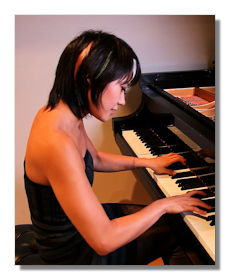
The Internet's Premier Classical Music Source
Related Links
- Latest Reviews
- More Reviews
-
By Composer
-
Collections
DVD & Blu-ray
Books
Concert Reviews
Articles/Interviews
Software
Audio
Search Amazon
Recommended Links
Site News
 Concert Review
Concert Review
Dazzling Rollercoaster

By Marc Haegeman
- Sergei Rachmaninoff:
- Etudes-Tableaux, Op. 39/4-6
- Elegy, Op. 3/1
- Gabriel Fauré: Ballade, Op. 19
- Alexander Scriabin: Sonata #5
- Johannes Brahms: 7 Fantasies, Op. 116
- Isaac Albéniz: Triana (from Iberia)
- Claude Debussy: La soirée dans Grenade (from Estampes)
- Vladimir Horowitz: Variations on a Theme from G. Bizet's "Carmen"
Yuja Wang, piano
Brussels Conservatory, 20 March 2012
The acclaimed Chinese pianist Yuja Wang made her debut in Belgium with the kind of disparate program that would have made giants like Sviatoslav Richter think twice, yet which seems designed primarily to demonstrate how dazzling a virtuoso she is. (Richter played what he felt like playing at a particular moment, but that's another story.) Wang's Brussels recital was largely culled from her coinciding new CD-release, imponderably titled "Fantasia" and sounded in spite of the hyped promise of "a poetic evening" for the most part like a no-brainer, rollercoaster collection of miniatures and bravura transcriptions by Rachmaninoff, Scriabin, Debussy, Albeniz and Horowitz, wherein the difference between the official program and the encores eventually went completely adrift. The bits of late Brahms and Fauré thrown in for weight couldn't dispel the frustrating feeling that this evening we only heard part of her talent. Or didn't we?
For sure, Yuja Wang's recital produced some stunning moments. She came to dazzle the audience, and that she did. 25-year old Wang boasts an awe-inspiring technique which allows her to tackle about anything effortlessly. Since she started out in 2005 her concerts garnered rave reviews and already guaranteed her a solid fan-base. Comparisons with her compatriot and fellow Curtis Institute-alumnus Lang Lang are inevitable, but the good news is that Wang seems foremost a straightforward artist, who doesn't rely so much on mannered exhibitionism to make her point. Yet although it may be unfair to judge from the program she brought to Brussels, what she doesn't have for now is much individuality or an original idea where to go with the music. Technically it's all amazingly executed but she cannot avoid sounding studied at times, humorless and dry.
The Rachmaninoff Etudes-Tableaux which kicked off the evening were very well played, with a remarkable dynamic variety and tonal control, with great clarity and definitely not without imagination. Contrasts were magnified, attacks were fierce and there was little doubt the big bad wolf meeting Little Red-Riding Hood in the Op. 39/6 Etude was going to have his day. The lyricism was well exposed in the Op. 39/5, although Wang's tendency to over-emphasize the left hand quickly became predictable. In spite of a nuanced dynamic range, Wang's piano has a rather small sound, which at times she tried to compensate by pumping up the bass chords.
The Scriabin Sonata #5 was a superb tour de force, quite brilliantly played as well, coherent and dramatic, yet by contrast the preceding Fauré Ballade sounded bland, far too inflected and over-pedaled, and lacking distinct French color.
The Brahms Fantasies, Op. 116 after the interval were variably successful. Extremely focused but unable to address the emotional maturity this work requires, Wang played the agitated Capriccii a bit too showy, running quickly into overly loud climaxes (Op. 116/1) or flashy endings (Op. 116/3). She captured the serenity of the Intermezzi generally well, although her accentuation of the last key of the repeated theme in Op. 116/2 sounded misfired.
The Albéniz Triana had plenty of zest and color and surged with enormous breath and vivacity. Debussy's La soirée dans Grenade, ripped from Estampes, impressed more by her control of sonority than by sheer evocative power.
Dead silence after the Debussy, but she brought the house down with a blistering rendition of the Horowitz extravaganza on Bizet's Carmen. More showy than witty, yet played with that much panache, it generated tremendous excitement. And she could continue the feast with four encores. While the audience's response after that killer Carmen was naturally rapturous, it looked as if we were going to get those encores no matter what. Wang has a coolly, mechanical way of acknowledging the applause which seems to fit well into her poker-faced delivery of the music.
Christoph Willibald Gluck's Melody from Orfeo ed Euridice in the arrangement by Giovanni Sgambati rippled with delicate fluidity, but Frédéric Chopin's famous Waltz #7 Op. 64/2 sounded irritatingly studied. Johann Strauss's Tritsch-Tratsch-Polka, Op. 214 in the knuckle-busting arrangement by György Cziffra once again highlighted what we already knew and Liszt's transcription of Schubert's Gretchen am Spinnrade gained impressive momentum.
Dazzled? Definitely, yes! Touched? Not really.
Copyright © 2012, Marc Haegeman












